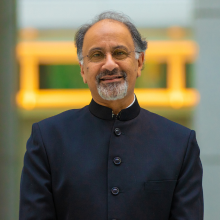World Bank Urges Nigeria to Commit to Economic Reforms
The Vice President and Chief Economist of the World Bank, Mr. Indermit Gill, stated yesterday that the Federal Government should continue its ongoing reforms despite the challenges faced by Nigerians.
He also praised the Central Bank of Nigeria (CBN) for unifying the exchange rates and urged the federal government to implement cost-effective safety nets to shield the most vulnerable citizens from the harsh effects of these reforms.
Speaking at the opening session of the #NES30# in Abuja yesterday, Mr. Indermit Gill acknowledged that the current administration’s reforms have caused hardship, particularly for vulnerable Nigerians. However, he emphasised that these reforms are the only viable path to economic recovery.
Gill stressed that for Nigeria to achieve sustainable growth, it must continue with these reforms, which, if fully implemented, could transform both the Nigerian economy and that of the entire Sub-Saharan Africa.

He said, “I don’t know if you agree with me or you don’t agree with me. If he does that, it will transform the economy of Sub-Saharan Africa.
It is very difficult to do these things, but the rewards are massive. This is the lesson from the last 40 years as well as countries such as Norway, Poland, and Korea.
“I am going to say something unpopular; perhaps Nigeria’s reforms from 2003 to 2007 were exactly what you needed, but they were not sustained. Today’s fiscal and monetary reforms are hurting everyone, especially ordinary Nigerians who are struggling with high prices of food and transport. The government must do everything in its power to protect the most vulnerable citizens against hardships because their lives and the lives of 110 million children depend on it.
He emphasised, “You must stay the course of the reforms because Nigeria’s future and the future of these 110 million children depend on it. During the coming years, Nigeria’s policymakers have three key options. The first is to prioritise non-oil exports.
“The exchange rate that Nigeria now has is the most effective in 20 years. It is a great opportunity. You must build foreign reserves as a buffer against oil volatility. Again, I think Governor Cardoso is doing many of these things, and I think he should be encouraged.
He went further: “Second, every vulnerable household needs government support to be able to survive the current difficulties. Install cost-effective safety nets to protect the most vulnerable people. Financing it from some of the savings from fuel subsidies and the exchange rate savings. “Nigerians’ need for jobs is immense. In the next ten years, more than 12 million Nigerians would enter the workforce. You need to generate jobs for them. You need to attract investments, especially in the non-oil sector.”
READ: Sleazy Journey Church Ex-Pastor Charged For Secret Photos
Content Credit| Igbakuma Rita Doom
Picture Credit | https://www.vanguardngr.com/2024/10/world-bank-says-26-poorest-economies-face-highest-debt-burden-since-2006/




